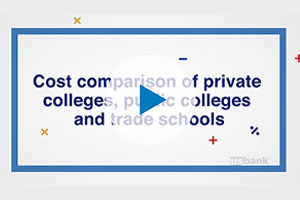
Should I itemize my taxes?

Investment strategies by age

6 things to know about long-term care insurance cost and benefits

Military homeownership: Your guide to resources, financing and more

Is your employer long term disability insurance enough?

How much life insurance do I need?

Do I need a financial advisor?

How to plan and save for adoption and in vitro fertility treatment costs

Preparing for retirement: 8 steps to take

Car shopping: Buying versus leasing your next vehicle

For today's homebuyers, time and money are everything

How I did it: Bought a home without a 20 percent down payment

Money Moments: Tips for selling your home

Should you buy a house that’s still under construction?

What financial advice would you give your younger self?

10 ways to increase your home’s curb appeal

What you should know about buying a car

5 things to avoid that can devalue your home

9 simple ways to save

3 awkward situations Zelle can help avoid

Here’s how to create a budget for yourself

Money Moments: How to manage your finances after a divorce

Money Moments: 8 dos and don’ts for saving money in your 30s

Travel for less: Smart (not cheap) ways to spend less on your next trip

Understanding guardianship and power of attorney in banking

What’s in your emergency fund?

What you need to know about renting

From LLC to S-corp: Choosing a small business entity

6 tips for trust fund distribution to beneficiaries

How to build wealth at any age

How to manage your money: 7 tips to improve your finances

LGBTQ+ financial planning tips

Your 5-step guide to financial planning

What is Medicare? Understanding your coverage options

5 financial goals for the new year

Retirement savings by age

Annual insurance policy review checklist

How I did it: Turned my side hustle into a full-time job

Retirement plan options for the self-employed

5 reasons why couples may have separate bank accounts

Common unexpected expenses and three ways to pay for them

It's possible: 7 tips for breaking the spending cycle

Closing on a house checklist for buyers

Multiple accounts can make it easier to follow a monthly budget

Is it time to get a shared bank account with your partner?

Don’t underestimate the importance of balancing your checking account

7 steps to keep your personal and business finances separate

Which is better: Combining bank accounts before marriage — or after?

30-day adulting challenge: Financial wellness tasks to complete in a month

Estate planning checklist: 8 steps to secure your legacy

8 steps to choosing a health insurance plan

Key milestone ages as you near and start retirement

Estate planning documents: Living trusts vs. will vs. living will

Why estate planning is important

How a Health Savings Account (HSA) can benefit your retirement plan

Year-end financial checklist

Finance or operating lease? Deciphering the legalese of equipment finance

Buying or leasing? Questions to ask before signing a contract

Insource or outsource? 10 considerations

The secret to successful service provider integration

How to improve your business network security

Safeguarding the payment experience through contactless

COVID-19 safety recommendations: Are you ready to reopen?

Unexpected cost savings may be hiding in your payment strategy

How to sell your business without emotions getting in the way

5 steps to take before transitioning your business

10 tips on how to run a successful family business

Talent acquisition 101: Building a small business dream team

Costs to consider when starting a business

How to test new business ideas

The costs of hiring a new employee

How to expand your business: Does a new location make sense?

How to build a content team

Multigenerational household financial planning strategies

How to track expenses

How to manage your finances when you're self-employed

Good debt vs. bad debt: Know the difference

Reviewing your beneficiaries: A 5-step guide

How to talk about money with your family

Financial steps to take after the death of a spouse

Retirement advice: How to retire happy

Retirement income planning: 4 steps to take

Preparing for retirement: 8 steps to take

Comparing term vs. permanent life insurance

Working after retirement: Factors to consider

4 steps to finding a charity to support

Year end tax planning tips

Tips for navigating a medical hardship when you’re unable to work

11 essential things to do before baby comes

Checklist: 10 questions to ask your home inspector

Resources for managing financial matters after an unexpected death

What you need to know as the executor of an estate

What documents do you need after a loved one dies?

How I did it: Paid off student loans

Bank Notes: College cost comparison

Webinar: U.S. Bank asks: Are you safe from fraud?

How you can prevent identity theft

Planning self-care moments that matter (and how to finance them)

Uncover the cost: Wedding

Uncover the cost: International trip

Tips to overcome three common savings hurdles

Adulting 101: How to make a budget plan

Personal loans first-timer's guide: 7 questions to ask

How can I help my student manage money?

Do you and your fiancé have compatible financial goals?

U.S. Bank asks: Transitioning out of college life? What’s next?

U.S. Bank asks: Do you know your finances?

Personal finance for teens can empower your child

How to save for a wedding

Dear Money Mentor: How do I set and track financial goals?

Lost job finance tips: What to do when you lose your job

Money Moments: 3 smart financial strategies when caring for aging parents

Money management guide to financial independence

7 financial questions to consider when changing jobs

How to stop living paycheck to paycheck post-pay increase

How grandparents can contribute to college funds instead of buying gifts

How to open and invest in a 529 plan

Using 529 plans for K-12 tuition

Parent checklist: Preparing for college

What to consider before taking out a student loan

How to use debt to build wealth

Crypto + Homebuying: Impacts on the real estate market

House Hacks: How buying an investment property worked as my first home

Your guide to breaking the rental cycle

4 ways to free up your budget (and your life) with a smaller home

Beyond the mortgage: Other costs for homeowners

10 questions to ask when hiring a contractor

Take the stress out of buying your teen a car

